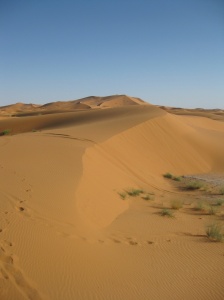 When I left off, I hinted at further travels. Where could I go after hitting Rabat, Tangier, Chefchaouen, Ifrane, Fez, Azrou, Marrakech, Casablanca and Essaouira, you ask? The desert!
When I left off, I hinted at further travels. Where could I go after hitting Rabat, Tangier, Chefchaouen, Ifrane, Fez, Azrou, Marrakech, Casablanca and Essaouira, you ask? The desert!
For less than $150, six friends and I spent the night in the sand dunes of Merzouga. One night might sound short, but it was enough. More than 36 hours with insane amounts of beauty, no sign of plumbing, few trees and no buildings is enough to start messing with the mind.
On the first day, our guides met us at the bus station at 6 a.m., drove us to the hotel and fed us. With food in our bellies, they ushered us into rooms where we could sleep or relax as we wished. After 10 hours on a rickety bus with three babies and a puker, this was exactly what I needed.
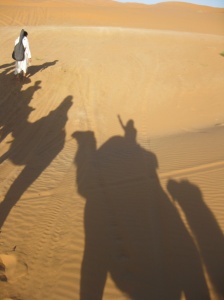 At 4 p.m., we met our newest travel companions: camels! They aren’t used to transport people as often as they once were, and it’s easy to see why. While I’m sure my beast of burden (deemed “Ted” after much deliberation) had the best of intentions, he was both higher and more bumpy a ride than any horse I’ve encountered. Every time we went downhill, I gripped him with my knees and prayed I wouldn’t slip off. The sand dunes are hard enough on my ankles, but I imagine being a 700-lb mammal with a person and luggage on your back makes it significantly more difficult.
At 4 p.m., we met our newest travel companions: camels! They aren’t used to transport people as often as they once were, and it’s easy to see why. While I’m sure my beast of burden (deemed “Ted” after much deliberation) had the best of intentions, he was both higher and more bumpy a ride than any horse I’ve encountered. Every time we went downhill, I gripped him with my knees and prayed I wouldn’t slip off. The sand dunes are hard enough on my ankles, but I imagine being a 700-lb mammal with a person and luggage on your back makes it significantly more difficult.
That afternoon, we trekked out to drink tea at an oasis (full of cats) and hiked up the dunes to watch the sunset. At nightfall, we counted the stars on a blanket outside a tent. Our guides cooked tajines on a gas stove for us and played music while we ate. Turns out they and their friends have some sort of desert-blues band! They tried to teach us Amazigh (the Berber language) and the drums but sadly failed at both.
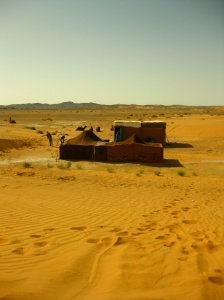 Sleeping conditions were what I had most feared, but we were actually quite comfortable on mats in a tent reminiscent of what I imagine Harry and Ron used at the Quidditch World Cup. Though we were sweating during the day, after sundown it got very cold. Thick blankets and the body heat kept the chill out. In the morning, we woke up to watch the sunrise, then crawled back into our beds for an early-morning snooze.
Sleeping conditions were what I had most feared, but we were actually quite comfortable on mats in a tent reminiscent of what I imagine Harry and Ron used at the Quidditch World Cup. Though we were sweating during the day, after sundown it got very cold. Thick blankets and the body heat kept the chill out. In the morning, we woke up to watch the sunrise, then crawled back into our beds for an early-morning snooze.
The incredible thing about the desert is how untouched it is. Everywhere else in Morocco there is a hanout on the next corner, stocked with bottled water and Kinder bueno, or a hotel boasting free wifi. We saw a few obvious tourist hot spots like the one where our tent was pitched and an Amazigh village full of mostly crumbled, roofless houses, but other than that, there was no infrastructure: just sand and stones, grass and rocks, lizards and graves. Our guides explained that that was why most of the families in the village had moved out; there was nowhere for their children to go to school. Only one family stayed behind, and they were nice enough to cook us “Berber pizza” (thick bread baked with cheese, chicken and vegetables inside) for lunch that day.
Our guides themselves really made the trip interesting. Most American teenagers would think of a day without internet, running water or television as a waste of 24 hours, but these guys had no trouble keeping us entertained.
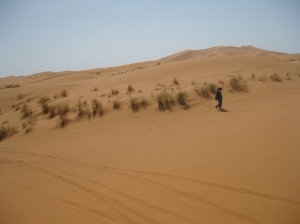 First there was Mustapha, 21 years old and the brooding musician type. He didn’t put his guitar down the entire time we were there. Coincidentally, he also fell head over heels for one of the girls from our program that had come on an earlier trek. The entire time we were there they texted back and forth, nonstop. This week, he is coming for a visit (inshallah or God willing, as Moroccans say after any expression of future tense) to Rabat. He speaks Arabic, French and Amazigh fluently, but his English is only so-so, leaving communication extremely limited. Sound enough like a rom com for you?
First there was Mustapha, 21 years old and the brooding musician type. He didn’t put his guitar down the entire time we were there. Coincidentally, he also fell head over heels for one of the girls from our program that had come on an earlier trek. The entire time we were there they texted back and forth, nonstop. This week, he is coming for a visit (inshallah or God willing, as Moroccans say after any expression of future tense) to Rabat. He speaks Arabic, French and Amazigh fluently, but his English is only so-so, leaving communication extremely limited. Sound enough like a rom com for you?
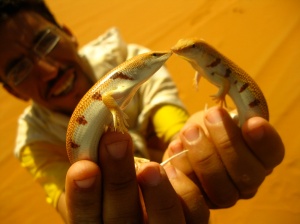 The other guide, Adi Kaka, was the crazier of the two. Adi’s English consisted of a handfull of phrases that he threw out seemingly at random. “Don’t speak, don’t move,” he would shout in the middle of a walk through the sand. How could we not move? And why exactly did we need to be silent? Both questions that will forever go unanswered. “You want hahas?” This question was repeated time after time while we were on our camels, with Adi walking beside us below. To our chagrin, we found that “hahas” actually meant anything from foot tickling to a little lizard on our legs. No one really wanted either of these things, but that didn’t stop Adi from asking.
The other guide, Adi Kaka, was the crazier of the two. Adi’s English consisted of a handfull of phrases that he threw out seemingly at random. “Don’t speak, don’t move,” he would shout in the middle of a walk through the sand. How could we not move? And why exactly did we need to be silent? Both questions that will forever go unanswered. “You want hahas?” This question was repeated time after time while we were on our camels, with Adi walking beside us below. To our chagrin, we found that “hahas” actually meant anything from foot tickling to a little lizard on our legs. No one really wanted either of these things, but that didn’t stop Adi from asking.
Almost a month later, I worry about Adi from time to time. At the end of the trek, he told us he was going to Casablanca soon to see a doctor. He complained of headaches and said he forgot things easily. I can’t imagine living with migraines in the desert, and I have no idea what sort of treatment is available in Morocco – let alone in the desert – so I can only hope that he soon saves the money to go live with his girlfriend in South America, as he planned.
Overall, the desert trek wasn’t quite as much a time for reflection and relaxation as I’d hoped, but I do feel immensely more powerful knowing that I’ve relieved myself in the sand dunes. If I can go without even a hole in the ground, I can do pretty much anything.

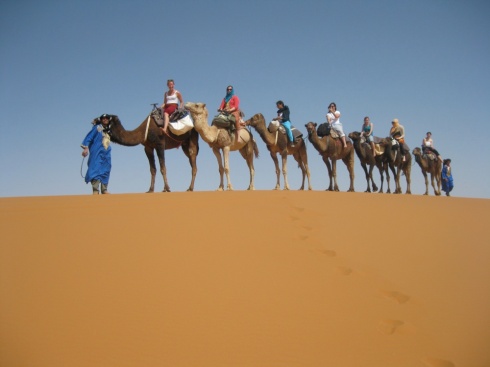
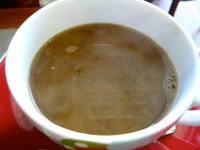
Leave a comment